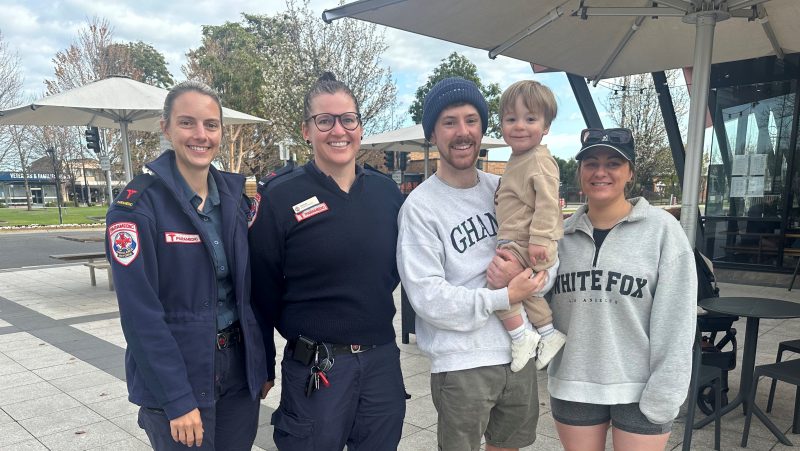Wodonga parents Jess and Sean were faced with the scariest night of their lives in March last year when their then 14-month-old son, Luca, experienced a cardiac arrest.
It was about 3am when the couple heard a distressed Luca screaming on the baby monitor.
Sean went to check on the toddler and found him unresponsive in his cot.
Springing into action, Sean called Triple Zero (000), checked his airways and began cardiopulmonary resuscitation (CPR).
Shortly after, a GoodSAM responder arrived at their home to help the family.
GoodSAM is a mobile app that connects patients in cardiac arrest with a nearby volunteer who is willing to start hands-only CPR while paramedics are on their way.
"When the GoodSAM showed up, they helped prepare by clearing space for the paramedics and made sure Sean was alright to continue doing compressions," Jess said.
"I stayed on the phone with the call taker who was talking us through CPR.
"Not long after, the paramedics arrived and gave Luca two shocks with a defibrillator."
After achieving return of spontaneous circulation, paramedics transported Luca to Albury Base Hospital where he was later airlifted to the Royal Children's Hospital.
Luca remained in hospital for about a month, spending the first three days intubated in the intensive care unit (ICU).
While Luca is now back at home and recovering well, the cause of his cardiac arrest remains unknown.

(L-R) Paramedics Bree Samuhel and Georgia Wright with Sean, Luca and Jess.
Ambulance Victoria paramedic Georgia Wright attended Luca's case and said his recovery was testament to his quick-thinking parents.
"For every minute without CPR, chances of surviving a cardiac arrest decrease significantly," she said.
"This case really highlights the importance of early and effective CPR. This ensured Luca's brain and vital organs continued to receive the oxygen and nutrients needed for survival.
"I have no doubt that his parent's actions played a key role in preventing Luca from suffering any long-term complications of his cardiac arrest."
Jess said the care the family received from the paramedics on the night was phenomenal.
"We are incredibly grateful for the support of the paramedics both during and after Luca's cardiac arrest," she said.
"They stayed with us when we arrived at the hospital as Luca was in a critical condition.
"They talked us through what was happening and were a calming presence. They were amazing."
In October, the family reunited with the paramedics while out for breakfast at a local café.
"It was very unexpected. They looked familiar but I couldn't remember if it was them as it was such a traumatic time," Jess said.
"Then they came and introduced themselves and we were able to catch them up on how Luca is going. It was really nice to have that full circle moment."
Georgia said the opportunity to reconnect with the family under much happier circumstances was very special.
"Being able to contribute to Lucas's recovery was a privilege, and seeing him out in the community, thriving with his family, was such a rewarding moment," she said.
After celebrating his second birthday in November, Luca is continuing to achieve his milestones without any deficits.
Both Jess and Sean are CPR certified and after seeing the difference the lifesaving skill made to their boy, want to encourage other parents to do the same.
"If you're going to be a parent, it's a skill you should have," Sean said.
"He was a perfectly healthy boy with no health issues and if we weren't prepared, there could have been minutes where he didn't get any assistance.
"You don't think you'll need it until you do. It definitely helped in our situation."
Recently, Ambulance Victoria released its 2023/24 Victorian Ambulance Cardiac Arrest Registry (VACAR) Annual Report, showcasing groundbreaking advancements in cardiac arrest response and survival rates across the state.
The report highlighted the significant impact of early intervention, with bystander CPR administered in 79 per cent of witnessed cases and 141 cases receiving a shock from a public Automated External Defibrillator (AED) - the highest number on record.






